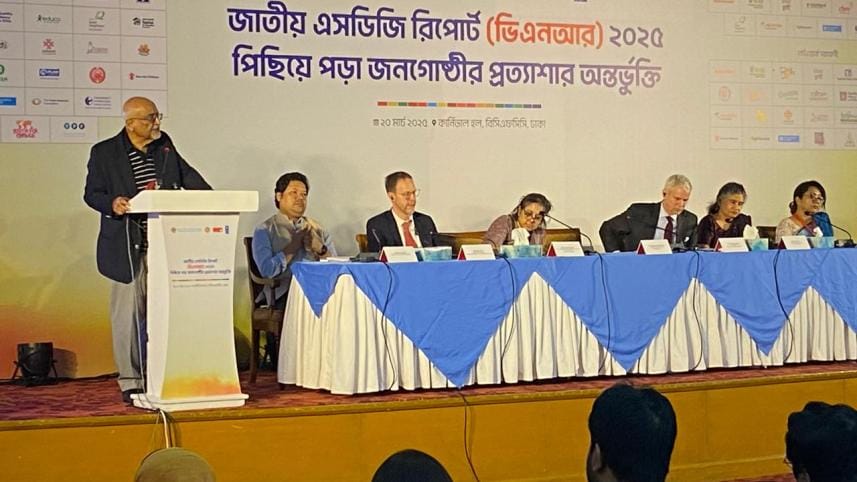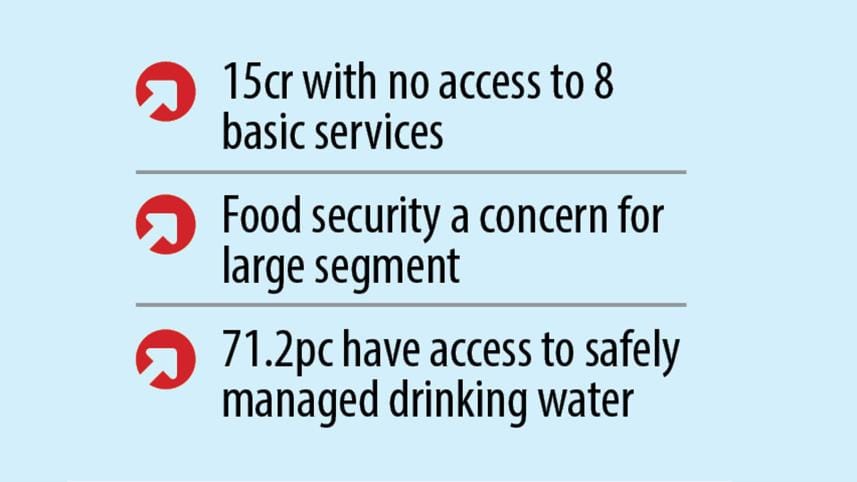87.5pc people left without basic services

About 87.5 percent, or 15 crore, of Bangladesh's citizens do not have access to all eight basic services such as clean drinking water, basic education, and sanitation facilities, according to a recent study.
The other basic services include hygiene facilities, clean fuel and technology, basic information services, basic mobility in rural and urban contexts, and basic waste collection services, according to the National SDG Report (VNR) 2025.

The study was prepared by the Citizen's Platform for SDGs in collaboration with the government and the UNDP, with support from Switzerland. Towfiqul Islam Khan, a senior research fellow at the Centre for Policy Dialogue (CPD), presented the study findings at a programme held at the Bangladesh China Friendship Conference Centre in Dhaka.
The progress in implementation of the Sustainable Development Goals (SDGs) is still low in many areas although only six years are left to reach the target, the study found.
For instance, the gender gap persists though it has been decreasing in certain cases. Disparities exist between rural and urban areas and regions, such as Chittagong Hill Tracts, are prone to vulnerability.
Many vulnerable groups are not counted in official statistics, while the gains in poverty reduction are rather fragile.
Food insecurity is still persistent, dealing a blow to the zero-hunger commitment.
Despite significant economic growth over the past decade, more than 26 percent of the population, or 23.6 million people, remain food insecure in Bangladesh.
Inclusive development also did not take place in areas like good health and well-being as maternal mortality and infant mortality rates were still high in a few districts.
Discrimination is also found in the area of education as quality and inclusive education cannot be given equally to males and females and in rural and urban areas.
Dalit and Adivasi populations are trapped in traditional occupations due to entrenched caste-based discrimination, stigma and limited access to education and skill development, restricting their participation in broader job markets, the study said.
Approximately 3.54 million children aged 5 to 17, or 8.9 percent of the total children, are engaged in economic work, according to the National Child Labour Survey 2022.
Of them, one-third, or 1.07 million, are involved in hazardous work, putting their health, safety and development at risk, the study said.
The study suggested that improving overall governance and delivering SDGs for the 'Leave No One Behind' (LNOB) group must resonate in the election manifestos.
Many have been pledging a lot but still, there is discrimination in the areas of education and health, said Debapriya Bhattacharya, the convenor of Citizen's Platform for SDGs, Bangladesh.
People will not accept the pledges and reforms if the political parties fail to include those lagging behind, he said.
The government has taken up the reform initiatives but the representatives of ethnic groups, religious minorities and women are not kept prominently in the reform committees, said Bhattacharya, a distinguished fellow at the CPD.
Reto Renggali, ambassador of Switzerland in Bangladesh, said, the Voluntary National Review (VNR) of the SDGs is not only a document, but it also helps to understand the situation.
Mustafizur Rahman, a distinguished fellow at the CPD, said every year, the international communities criticise the poor progress of SDG 17, which pertains to strengthening the means of implementation and revitalising the Global Partnership for Sustainable Development.
As much as 60 percent of the time has passed and only five to six years are remaining for the implementation of the SDGs, he added.
Lamiya Morshed, principal coordinator for SDG Affairs of the Chief Adviser's Office of Bangladesh government; Saibun Nessa, partnership manager and senior programme adviser of Gender, diversity and advocacy HEKS/EPER Bangladesh; Pallab Chakma, executive director of Kapaeeng Foundation; Huma Khan, senior human rights adviser of UNRCO-Bangladesh; and Stefan Liller, resident representative of the United Nations Development Programme Bangladesh, also spoke.



 For all latest news, follow The Daily Star's Google News channel.
For all latest news, follow The Daily Star's Google News channel.
Comments